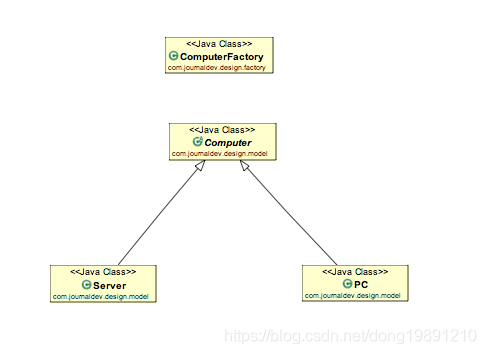Java工厂设计模式
工厂模式就是好
工厂模式很普遍,想必好多人一开始接触的就是这个模式了
工厂方法模式一种创建对象的模式,它被广泛应用在jdk中以及Spring、Mybatis、Hibernate和Struts框架中;
工厂方法模式基于"输入",应用在超类和多个子类之间的情况,这种模式将创建对象的责任转移到工厂类;
首先让我们学习一下如何在Java中应用工厂方法模式并且学习到工厂方法的优点,另外工厂方法模式也广泛应用在jdk中;
超类可以是接口、抽象类、父类,本例中将通过重写 toString() 方法来解释工厂方法模式;
结构图如下:

基类代码:
工厂模式子类,有四种实现:
定义工厂类
现在有了多个子类和超类,接下来可以创建工厂类了:
需要重点指出的是:
工厂类可以是单例的,getComputer 可以是静态的;
getComputer 是工厂类的方法,且基于相同的参数类型返回了不同的对象;
接下来是一个简单的测试客户端程序,它使用上面的工厂设计模式实现。
输出结果:
很好四款产品都合格,没有劣质产品
工厂设计模式的优点
- 面向接口编程,体现了面向对象的思想;
- 将创建对象的工作转移到了工厂类,不用自己new了,委托给工厂生产合格产品
JDK 中的工厂设计模式实例
- java.util.Calendar, ResourceBundle and NumberFormat getInstance() 使用了工厂方法模式;
- valueOf() 在包装类中,如Boolean, Integer 也使用了工厂方法模式;
工厂模式在框架里的体现
- Mybatis: DataSourceFactory,SqlSessionFactory,MapperProxyFactory很重要
- Spring: 一系类***BeanFactory
工厂模式在以前开发中的应用场景:
- 数据库连接,数据库连接工厂通过参数化可返回具体的数据源
- 存储系统开发时协议, nfs,cifs,ftp等
- 新疆安防,不同厂商ABCDE等的监控设备对接
- 支付方式,客户购买服务后,支付类型的选择支付宝、银联,可以继续追加其他支付类型
- 数据导入导出,json,txt,excel等
- 。。。。。。工厂模式太普遍了,不一一举例了
小结: 工厂模式很好用,也很实用!!!师傅领进门,修行靠个人,不要老背代码(看到不少人喜欢背代码却不会变通),要想不同的模式在场景怎么使用、如何使用、使用哪种模式,不是靠死记硬背,当然了也许他们搞明白概念,加油!!!
附代码已上传https://github.com/dongguangming/design-pattern/tree/master/src/code/factory
参考:
0. java factory design pattern https://www.w3spoint.com/java-factory-design-pattern
1. Java Design Pattern: Factory https://www.programcreek.com/2013/02/java-design-pattern-factory/
2、Implement factory pattern in Spring when using Java configuration.
https://javajee.com/content/recipe-factory-beans-in-spring-with-java-configuration
3、Factory Design Pattern in Java
https://www.journaldev.com/1392/factory-design-pattern-in-java
4. Factory Design Pattern in Java (要FQ)http://adnjavainterview.blogspot.com/2015/07/factory-design-pattern-in-java.html?m=1
5. 要FQ https://www.javaguides.net/2018/07/factory-pattern-from-head-first-design-patterns.html?m=1
6. Factory Method Design Pattern
https://springframework.guru/gang-of-four-design-patterns/factory-method-design-pattern/
7. Java: Factory Design-Method Pattern | Object Oriented Design | Design Patterns
https://crunchify.com/java-factory-design-method-pattern-object-oriented-design-design-patterns/





 浙公网安备 33010602011771号
浙公网安备 33010602011771号